 |
  |
 |
  |
Remembering Rukmini Devi - A Woman of Substance on her 117th birth anniversary - VP Dhananjayan e-mail: bkalanjali@gmail.com Photos courtesy: Archives of The Dhananjayans February 21, 2021 An orator with amazing English vocabulary and attractive personality, Rukmini Devi Arundale is a wonder woman of the century. A school dropout with academic excellence, who almost made it to the highest office of the country Bhaarat... A leap year baby (1904 to 1986), she was an exemplary woman of substance. "Pithaa rakshati kaumaare Bhartha rakshthi yaw-wane Puthro rakshathi vardhakye Na Stree swaathanthrya marhathi" (Father protects in childhood (until marriage) Husband takes care in youth (marriage and after) Children take care and protect during old age So, women need no independence) 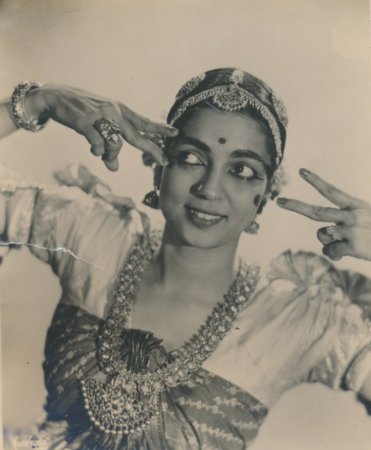
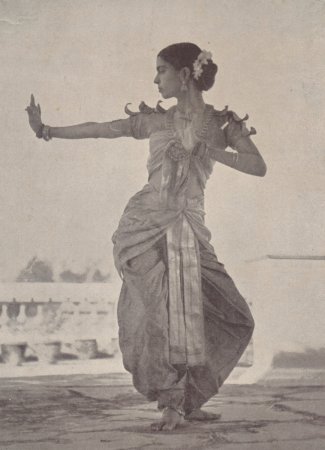
This old saying in Samskritam varies with positive and negative interpretations. Actually the essence of the connotation and its deeper meaning is very positive to say that women at any time should be protected by society. Yes, our epics, mythology and history have abundant stories with evidence to prove that Bhaarata naari were well respected and protected, yet there are incidents of humiliation they suffered on account of male chauvinism. After our independence from our invaders, a drastic attitude change became visible within our own society. Until then the question of atrocities on women did not arise and they did survive equally with their counterparts. One such example was Rukmini Devi Arundale - a beacon of light guiding a nation's cultural ethos for generations to come. She did not believe in formal academic education but education in the real sense of refining oneself with discipline, devotion and dedication. She often quoted, "Academic degree or education without character is body without head." Art and culture are the inseparable aspects of human life and art fosters and nurtures the 'samskaara' (culture) of men and women for a happy life of beauty without vulgarity in thoughts and actions. Rukmini Devi did not believe in feminist liberation theory or such movements; she had no problem of independence, a free woman of individuality and freedom of thoughts. She achieved what many men could not. 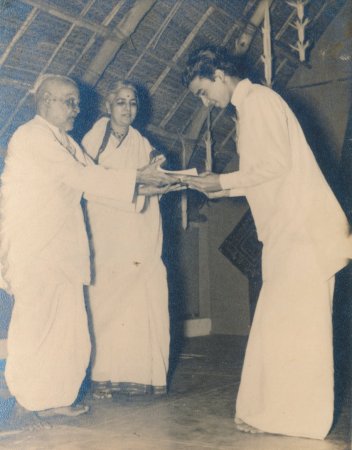 Mysore Vasudevachaar, Rukmini Devi, Dhananjayan receiving Kalakshetra diploma (1960) 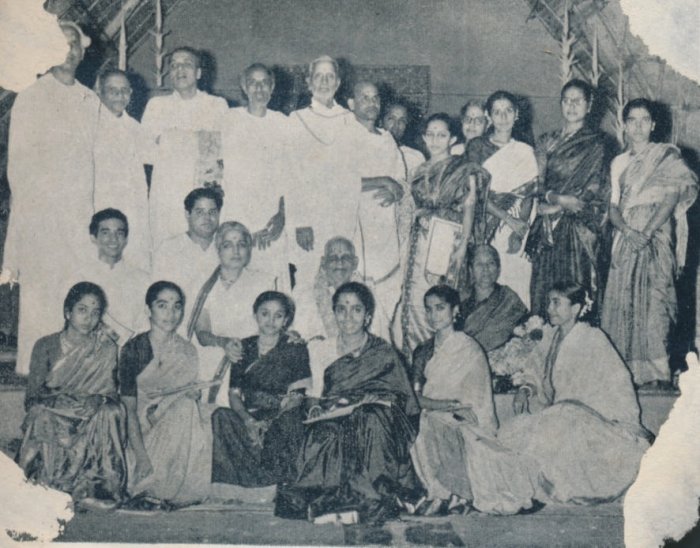 Diploma holders with Rukmini Devi, Mysore Vasudevachaar and teachers (1960) Realizing the power of Naatya -the essence of real education inculcating the physical, mental and spiritual discipline, she envisaged an art integrated educational system that would see an independent Bhaaratam justifying the real meaning of the country's name left behind by the great Rishis of the past. Kalakshetra, the Gurukulam (residential learning center) was the result of her quest for enlightenment. Education, enlightenment and entertainment or relaxation are the purpose of Naatya with which she modeled her mission and vision for future generations of this country suffocating with alien culture that did not suit the environment of Aarsha-Bhaaratam. Attached to the Theosophical Society campus in Adyar, an outskirt of then Madras was literally turned into an ideal place of worship and to people Kalakshetra became a center of pilgrimage. A place of learning is a temple of worship and Achaaryas are the venerable priests of the gods' abode and that was how Rukmini Devi's dream or vision became a reality. She was very lucky to have had a galaxy of dedicated workers like Sankara Menon, Dr. Padmasani and several stalwarts in diverse fields contributed much to the development of the center, which ultimately had to shift to Thiruvanmiyur. 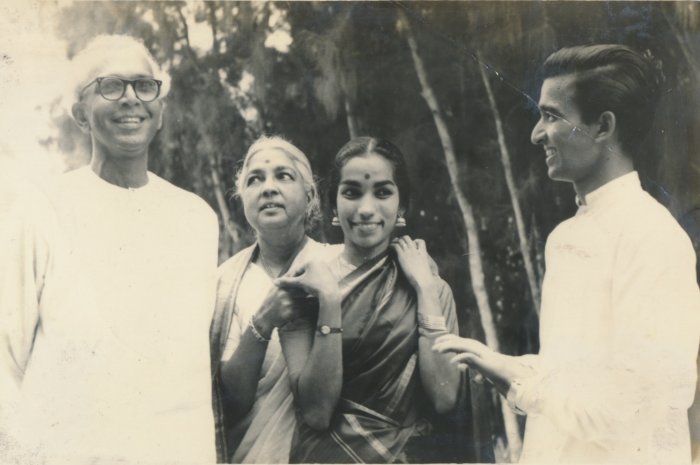 Sankara Menon, Rukmini Devi, Shanta and Dhananjayan As inmates of the Gurukulam, she gave us the task of rebuilding a monumental temple of arts on a sandy beach. That was also her vision to make all her protégé an integral part of Kalakshetra's growth as an international center for Art which nurtured a true Bharateeya samskaar. She was a total Bhaarateeya in her thoughts and actions, though married to a westerner and mostly mingled with Europeans who were also steeped in the eastern philosophy and culture. She took the best of the west to better our education in a holistic manner. Rukmini Devi was neither an activist nor a feminist, she believed in a natural biological strength of either sex. Equality among human beings is a matter of individual intelligence and application. Many a time the suppression of women in society came in due to certain compulsions and practice of customs not quite congenial to a progressive society. The Music Academy passed a resolution to reinstate the age old name Bharatanaatyam to save those practitioners chastised by so-called high castes. The credit for popularizing and re-establishing refinements in the system and uplifting the morality of those scholarly sangeeta vidwans (nattuvanaars) and vidushis (otherwise treated like untouchables) should go to Rukmini Devi. She embraced Mylapore Gowri Amma and others from that chastised community who were looked down upon. She gave a scholarship to a nattuvanar boy Devanathan to get training in naatyam and nattuvangam. He was trained well in Kalakshetra and went to Delhi to do nattuvangam for Yamini Krishnamurthy and others. There was a student who later joined films as a dance composer. Rukmini Devi paved the way for all communities, rich and poor, to come into one common community of Naatya fraternity. That is how several artists like me from a low income family could become practitioners of this rich art inherited from a rich legacy. Rukmini Devi was instrumental in cleansing the stigma to the art form and brought dignity and divinity not only to the art but also to the practitioners of Sadir or Daasi-aattam. 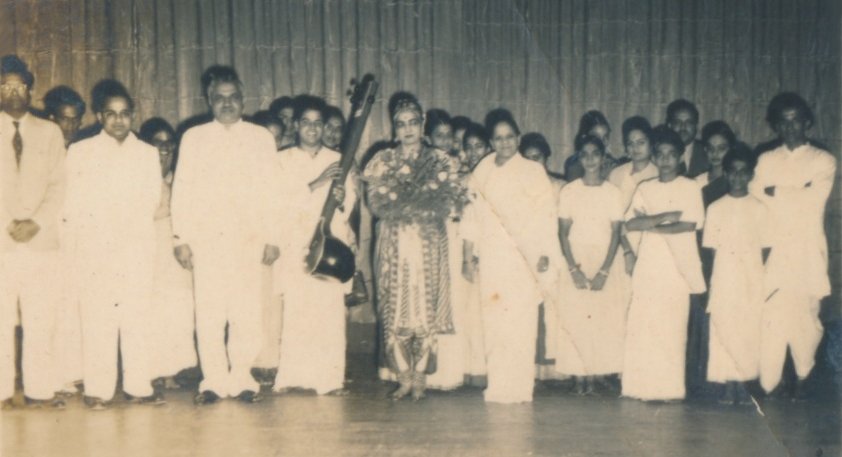 Rukmini Devi's last performance in Delhi (1956/57) 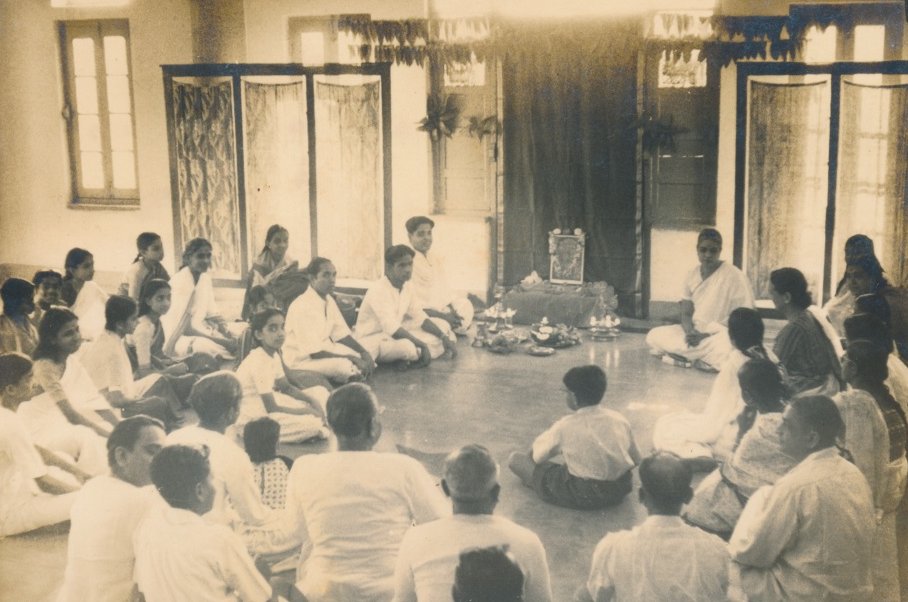 Rukmini Devi conducts bhajans and Saraswathi pooja in Patna (1956/57) In a happy coincidence, this tribute by Rukmini Devi to Mylapore Gowri Amma was recently published in The Hindu dated Jan 22, 2021 from their archives. Fifty years ago January 22, 1971 Mylapore Gowri Amma: Rukmini Devi: It is with deep sorrow that I realise that a great artist has left us. One by one India loses these persons and, unfortunately, with them also disappears a great tradition. Our younger generation does not have strong enough roots in our religious or cultural traditions for these to flourish when modern Western civilisation is overwhelming India. With an awakening of the consciousness of our art and the winning of freedom, wider knowledge and appreciation of art has taken the place of the deeper understanding. Among the great dancers whom I have known, Gowri Amma was the first one whom I met. It was after seeing Meenakshisundaram Pillai's two disciples, Jeevaratnam and Rajalakshmi dance, that I decided to learn this art. I searched everywhere for a teacher, but as often happens, one searches everywhere except nearest to oneself. Many teachers were suggested to me, but I went to meet Gowri Amma in the home where she lived in Mylapore. My first lesson started with her as my teacher with the sabdam "Sarasijakshulu". After that I arranged for her to come to Adyar to my home to teach me. I was learning secretly at that time that a large number of people in the country were against the dance. Realising the poor economic conditions of Mylapore Gowri Amma, Rukmini Devi employed her in Kalakshetra at a ripe age, paid her good salary and also offered a residential facility in the campus asking all of us to take care of her. Unfortunately, her son, a habitual drunkard, could not be accommodated there, so she was compelled to stay in a one room shack in Mylapore, commuting from there every day to Adyar Kalakshetra and then to Thiruvanmiyur. We were witness to the coercion of her errant son snatching the salary she received every month. Rukmini Devi wanted one of her granddaughters who used to accompany her to the class, to be trained in Kalakshetra, gave her full scholarship and enabled her stay with Gowri Amma in the campus. But that girl attended a few classes and then stopped. Balasaraswati's brother Ranganathan, a good mridangist, was engaged to play for Kalakshetra dance drama productions and Bharatanaatyam programs. He was there rehearsing with us for almost a year or so, then left for the US with his sister and brother, flautist Viswanathan. Rukmini Devi invited Balaamma to perform in Kalakshetra for all of us to witness her performance in close quarters and honoured her with such magnanimity and high respect to which we were all witness. Let me share a few pleasant anecdotes from the pages of our long association. The first and the foremost incident that I would never forget is when she called out to Sankara Menon Sir seeing me and Balagopal enter Arundel House with Asaan Chandu Panicker, "See Appunni, who is coming. Viswamitra, Raama and Lakshmana," not realizing why we were there. We were fresh from Kerala and did not know whom we were meeting and why. That felt like a prediction and she cast us as Raama-Lakshmana in her magnum opus production Sita Swayamvaram, a monumental naatya production. I continued to play the same role in four of the Ramayana series. She branded me as Sri Raama and would not cast me in any other minor roles and not even Srikrishna. But on one occasion there was an emergency due to Balagopal's sudden illness with no alternate Krishna to take over. The performance was in Hyderabad and there was no time to train anyone overnight. When I volunteered to play the role she chided me saying, "You cannot be a good Krishna like Balagopal." Fortunately for me there were no other boys to substitute, so she had to allow me to save the situation. I did the role successfully with just one rehearsal and after the performance she was in tears. "Sorry I missed judging your capacity and you are indeed a superb Krishna," she complimented liberally. She could be magnanimous at times and the opposite sometimes. Those days, the achaaryas were not very liberal in complimenting their students. If they kept silent, that meant we have performed satisfactorily. On one occasion in the Kathakali class, Asaan taught me a very slow and difficult Padam with very sensitive emotions for which he was very well known (for Dharmaputra in Kirmeera Vadham) taking almost a couple of months. One day after watching me doing this padam in the class, Asaan walked away silently without making any comment. The whole class, the musicians and my other colleagues were wondering why the class had stopped abruptly. Asaan had straightway gone to see Rukmini Amma and told her something about the class. While we were returning to our hostel, Amma called out to me from her office upstairs and said she and Sankara Menon would be coming to the Kathakali class the next day. This was unusual and we waited for her arrival the next day. Asaan asked me to perform his forte padam again in front of Amma and Sankara Menon. The padam lasts almost an hour, and I was lost in the concentrated performance but others watched the reactions of Amma and Menon sir and Asaan too. At the end she only made a comment, "No wonder why Asaan wants us to watch you..." and coolly walked away. That was enough to cherish for a lifetime! 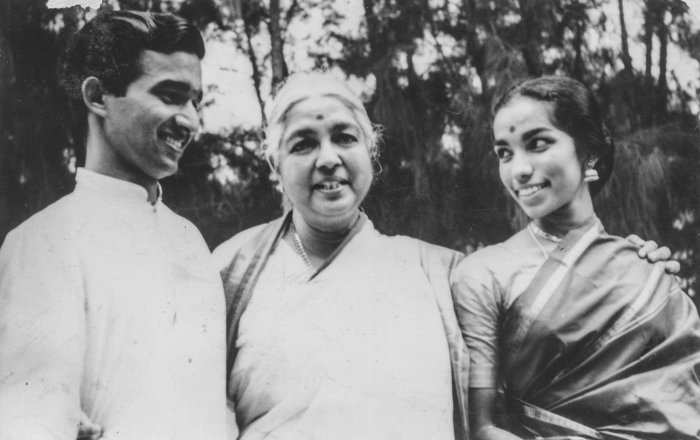 Dhananjayan, Rukmini Devi, Shanta There are several anecdotes, some pleasant and a few bitter ones too. Let me share a hilarious anecdote. After a Sita Swayamvaram performance in Sapru House in Delhi (1956) Pt. Jawaharlal Nehru (PM) came on the stage to congratulate all of us and held me and Balagopal (Srirama & Lakshmana) on his two sides and told Amma, "Rukmini, why are you not feeding these kids properly?" (We were quite thin at that time). She retorted saying, "They can't dance well if they eat more... Government should stop rationing food or allow us to draw more ration..." There was laughter all around including Nehruji. In 1966, we travelled throughout Australia in a luxury bus performing every day and sometimes matinee shows on weekends. Amma travelled with us in the same bus. That was a great occasion for all of us to be closer to her and know her motherly side. Also to serve her better by looking after her needs. During the bus journey, everyone sang and conducted bhajans, made fun of each other and she used to enjoy it. She would also mimic musicians and known personalities. If she was in her elements, she could be quite an entertainer like a teenage girl. Rukmini Devi came into the world at the right time and right place as all our scriptures promulgated, similar to an Avataara Naari (woman), a wonder woman of the century who left a large legacy, unimaginable to our generation. 1950 to 1975 may be marked as the golden period of Kalakshetra with all of us, her best of students closely associated and her work of art blossomed in the garden of everlasting creativity. She was able to instill in us what she meant by saying beauty in art without vulgarity, so her creations through us are the monumental legacy attracting true art connoisseurs to watch them over and over again, with nostalgic memories of that golden period. She lives through us who uphold the values of her vision and carry it to the next generation. 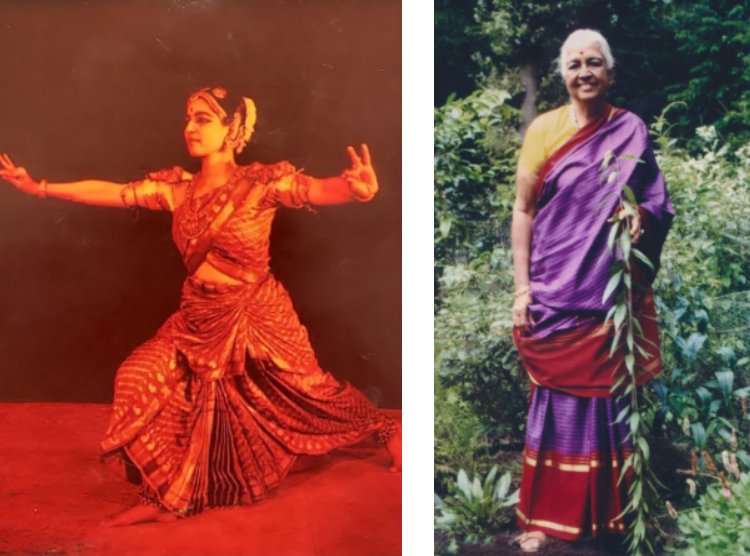 On this occasion of Rukmini Devi's 117th birth anniversary, I am pained and shocked, upset and distressed to hear that attempts are being made to tarnish her legacy and misrepresent her extraordinary contribution to modern Bhaarateeya Samskriti, and Bharatanaatyam. To paint Rukmini Devi as an archetypal antagonist, clashing with the hereditary artistes is very wrong. A simplistic and one sided caste based view of Bharatanaatyam's entangled history between the gurus, nattuvanars and Devadasis is not the need of the hour. Rukmini Devi was deeply respectful towards the traditional performers and always honoured their knowledge and invaluable place in Naatya history. Even though she was offered the post of the highest office - Rashtrapati - she declined. As a nominated Member of Parliament she did much more than the elected members, without expecting any reward or award, taking up the cause of animal welfare and propagating the ideals of Buddha and Mahatma Gandhi - Ahimsa paramo dharma (non violence is the greatest virtue). After independence our educational system went awry, lost direction whether to follow European liberal system or Bhaarateeya disciplinary method. The result was a chaotic system without discipline, direction and decorum. Rukmini Devi through her Art center and academic schools gave a comprehensive Art integrated education moulding several world class citizens. Among all the legends of Bhaarat, Rukmini Devi did indeed deserve a Bharat Ratna. For those of us and generations of students who have been nurtured under her vision and dynamism, these recent claims by young scholars living in the UK and the USA are poisoning young minds and creating a rift in the global dance community.  Naatyaachaarya V.P. Dhananjayan is one of the prime students of Rukmini Devi - a true torch bearer of this wonder woman of the century. He is the Founder & President of Bharata Kalanjali, Chennai. Comments * A wonderful tribute that offers beautiful and varied insights - and we know that it is from first hand experience - into the unique personality of Rukmini Amma. So happy to have come across this article.Thank you. - Ambili Ramnath (June 10, 2021) * What a beautiful tribute to a great Guru by a great Shishya! For youngsters like me who didn't have the fortune of seeing Rukmini Amma, you brought her before our eyes. Truly a lady of great substance and dignity! India and the world needs more such women who pride in their womanhood and take the power of the feminine notches higher. Whenever I see her image, I see a Tapasvini who dedicated her whole life for the cause of the arts. My pranams to Rukmini amma and to Dhananjayan anna. - Subramanian Chidambaran (Feb 26, 2021) * Comprehensive and insightful, a wonderful tribute to a true pioneer. - Tara Rajkumar (Feb 23, 2021) * Wonderfully essayed, anna.The article is an appropriate delineation of Rukmini Devi's mission and vision. - R Revathi (Feb 22, 2021) * Excellent article, Anna. - Ananda Shankar Jayant (Feb 22, 2021) Post your comments Please provide your name and email id along with your comment. All appropriate comments posted with name and email id in the blog will also be featured in the site. |